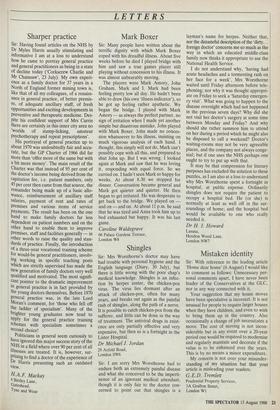LETTERS Sharper practice
Sir: Having found articles on the NHS by Dr Myles Harris usually stimulating and informative I am at a loss to understand how he came to portray general practice and general practitioners as being in a state of decline today (`Corkscrew Charlie and Mr Chainsaw', 23 July). My own experi- ence as a family doctor for 37 years in a North of England former mining town is, like that of all my colleagues, of a renaiss- ance in general practice, of better premis- es, of adequate ancillary staff, of fresh opportunities and exciting developments in preventive and therapeutic medicine. Des- pite his confident support of Mrs Currie there are certainly in this inner city area no `worlds of stamp-licking, amateur psychotherapy and repeat prescriptions'.
His portrayal of general practice up to about 1970 was undoubtedly fair and accu- rate, but the GP Charter of 1966 did far more than 'offer more of the same but with a bit more money'. The main result of the Charter was that instead of 95 per cent of the doctor's income being derived from the capitation fee, i.e. patient numbers, only 45 per cent then came from that source, the remainder being made up of a basic allo- wance, reimbursement of ancillary staff salaries, payment of rent and rates of premises and various items of service payments. The result has been on the one hand to make family doctors far less dependent on patient numbers and on the other hand to enable them to improve premises, staff and facilities generally — in other words to raise the quality and stan- dards of practice. Finally, the introduction of a three-year vocational training scheme for would-be general practitioners, involv- ing working in specific teaching posts which are strictly supervised has made the new generation of family doctors very well qualified and motivated. The most signifi- cant pointer to the dramatic improvement in general practice is in fact provided by the young doctors themselves. Before 1970 general practice was, in the late Lord Moran's comment, for 'those who fell off the ladder of specialism'. Many of the brighter young graduates now tend to apply for the general practice training schemes with specialism sometimes a second choice!
Politicians in general seem curiously to have ignored this major success story of the NHS in a field where over 90 per cent of all illnesses are treated. It is, however, sur- prising to find a doctor of the experience of Dr Harris presenting such an outdated view.
H.A.F. Mackay
4 Birtley Lane, Gateshead, Tyne and Wear






















































 Previous page
Previous page